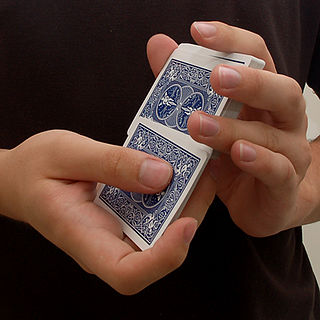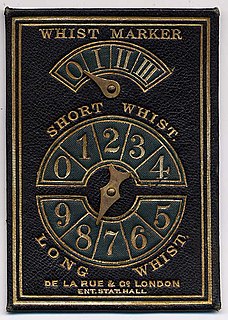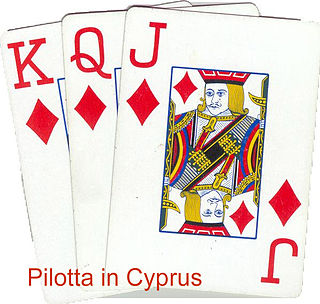
Shuffling is a procedure used to randomize a deck of playing cards to provide an element of chance in card games. Shuffling is often followed by a cut, to help ensure that the shuffler has not manipulated the outcome.

Sheepshead or Sheephead is a trick-taking card game invented by Julius Meinen. It is the Americanized version of Bavaria's national card game, Schafkopf, albeit the latter is played with Bavarian-pattern cards unlike its American descendant. Sheepshead is most commonly played by five players, but variants exist to allow for two to eight players. There are also many other variants to the game rules, and many slang terms used with the game.

Whist is a classic English trick-taking card game which was widely played in the 18th and 19th centuries. Although the rules are simple, there is scope for scientific play.

In playing cards, a suit is one of the categories into which the cards of a deck are divided. Most often, each card bears one of several pips (symbols) showing to which suit it belongs; the suit may alternatively or additionally be indicated by the color printed on the card. The rank for each card is determined by the number of pips on it, except on face cards. Ranking indicates which cards within a suit are better, higher or more valuable than others, whereas there is no order between the suits unless defined in the rules of a specific card game. In a single deck, there is exactly one card of any given rank in any given suit. A deck may include special cards that belong to no suit, often called jokers.

Card manipulation is the branch of magical illusion that deals with creating effects using sleight of hand techniques involving playing cards. Card manipulation is often used in magical performances, especially in close-up, parlor, and street magic. Some of the most recognized names in this field include Dai Vernon, Tony Slydini, Ed Marlo, S.W. Erdnase, Richard Turner, John Scarne and Ricky Jay. Before becoming world-famous for his escapes, Houdini billed himself as "The King of Cards".

The deck of French playing cards is the most common deck of playing cards used today. It includes thirteen ranks in each of the four French suits: clubs, diamonds, hearts and spades, with reversible "court" or face cards. Each suit includes an ace, a king, queen and jack, each depicted with a symbol of its suit; and ranks two through ten, with each card depicting that many symbols (pips) of its suit. Anywhere from one to six jokers, often distinguishable with one being more colorful than the other, are added to commercial decks, as some card games require these extra cards. Modern playing cards carry index labels on opposite corners or in all four corners to facilitate identifying the cards when they overlap and so that they appear identical for players on opposite sides. The most popular standard pattern of the French deck is sometimes referred to as "English" or "Anglo-American" pattern.
A trick deck usually refers to a deck of playing cards that has been altered in some way to allow magicians to perform certain card tricks where sleight of hand would be too difficult or impractical.
Bonken is a trick-taking card game for 4 players that is played with a deck of cards. Everyone plays for themselves. In total 11 rounds are played, in which every round has its own goal. The goal of the game is to score as many points as possible. The player who scores the most points is declared the winner.

Sheng ji is a family of point-based, trick-taking card games played in China and in Chinese immigrant communities. They have a dynamic trump, i.e., which cards are trump changes every round. As these games are played over a wide area with no standardization, rules vary widely from region to region.
This is a glossary of conjuring terms used by magicians.
The Twenty-One Card Trick, also known as the 11th card trick or three column trick, is a simple card trick that uses basic mathematics to reveal the user's selected card.
Spelling Bee may refer to one of several card tricks that revolve around the spelling of card types, audience member names, or words suggested by the audience. Many make use of decks prepared in advance in order to provide the illusion of spelling card names in a particular sequence. The Encyclopedia of Card Tricks lists a number of such spelling-based tricks.
Blackstone's Card Trick Without Cards is a magic trick. As the trick requires only that a card is thought of, it does not require the use of a deck of cards.

Pilotta (in Greek Πιλόττα) is a trick-taking 32-card game derived from Belote. It is played primarily in Cyprus, being very popular among the Cypriot population, especially the youngsters, who usually arrange “pilotta meetings” in places such as cafés and cafeterias. Its counterpart played in Greece is named Vida.

Penn & Teller's Cruel Tricks for Dear Friends is a 1987 direct-to-video program hosted by magicians Penn & Teller. Produced by The Mofo Video Corp. and released by Lorimar Home Video, the tape features seven different swindles or tricks that the home viewer can use to fool their friends. The tape was a companion piece to their best-selling book of the same name, released two years later. All of the tricks involve using a portion of the videotape.
The faro shuffle (American), weave shuffle (British), or dovetail shuffle is a method of shuffling playing cards.
Brother John Charles Hamman S.M. was a close-up magician and Marianist Brother. The tricks he invented are still an integral part of many close-up magician's repertoire. Hamman was world-renowned in the magic community. His initial interest in the art started as a child. As he recuperated from polio, he spent hours learning, practicing and inventing card tricks and other magic involving sleight-of-hand. In many cases, he "reinvented" classic maneuvers or streamlined them. He was a member of the International Brotherhood of Magicians, the Catholic Magicians' Guild and the Society of American Magicians.

This article deals with variations in game playing. For a description on variations in game rules and terminology, see Euchre variations.
Rentz is an American version of the Romanian card game Renț. Rentz is a compendium game mainly comprising trick-taking deals or 'mini-games'. The object of each deal is to either avoid taking "tricks" or score points. The game can be played by four players, each of which is dealt 13 cards from a standard playing card deck at the start of each hand.

Officers' Skat (Offiziersskat), is a trick-taking card game for two players which is based on the rules of Skat. It may be played with a German or French card deck of 32 cards which, from the outset of the game, are laid out in rows both face down and face up. As in Skat, tricks are taken and card points counted to determine the winner of a round; game points are then awarded to decide the winner of a game. It is also called Two-hand Skat, Sailors' Skat (Seemannsskat), Farmers' Skat (Bauernskat), Robbers' Skat (Räuberskat) or Coachmen's Skat (Kutscherskat)












